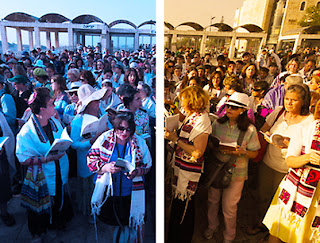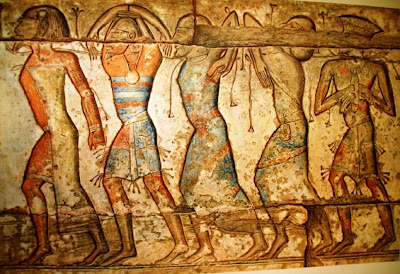WoW - When a Split Can Be a Good Thing
Last month, the Board of Directors of Women of the Wall (WoW) voted to accept a compromise solution, whereby WoW would move its Rosh Chodesh prayer service to a new egalitarian section of the Kotel to be built
in the area known as Robinson's Arch. A minority of WoW remains opposed to
this compromise, seeing it not as a "compromise" but rather a surrender to Orthodox demands and a renouncement of WoW's very raison d'être. They thus want to continue praying in the women's section, in accordance with their legal right. Honestly, I can understand both sides.
As I said in my previous post, we are dealing with a clash of two distinct visions for Israel as a society. And if all we do is push at one another, each side vying unyieldingly for its own self-interests without concern for the other, we will decrease the quality of life for everyone. Compromise is vital if we wish to be a strong Jewish people and a strong Israel.
What this compromise does is allow WoW to pray as they want, sing aloud - proudly and joyfully - without concern that it will disturb anyone, and in a space where no one will bother them, a space which is also part of the Western Wall (albeit in a section a bit further down). In addition, the new section will allow for egalitarian prayer, opening up new opportunities for other Jewish denominations, which the current setup at the Western Wall does not accommodate. It's a move for equality, only rather than shake up the existing space and force people into a change they don't want, it creates a new parallel space. That seems to me to be a very sound idea. Because at the end of the day, even if WoW is legally allowed to pray in the women's section, so too are others legally allowed to protest it. And who wants to live with protests month after month? It's not a healthy long-term situation.
On the other hand, when we refer to the "Kotel" we generally don't mean the entire Western Wall of the Temple Mount. We mean a specific portion of the Wall and plaza to which people the world over flock to pray. It's the place tourists come to, where national ceremonies are held, the place depicted on postcards and etched into people's hearts as the spiritual-geographical hub of the Jewish people. What the compromise says is that the Kotel is not the symbolic remnant of the "house of prayer for all nations," nor is it even a place where all Jews can come and pray in groups according to their customs. Rather, it's an "Orthodox space," and if you don't pray according to customs that they consider acceptable, you're relegated to a "side area." And even if this area is spacious and tastefully built, it's still not "the Kotel" which everyone thinks of and comes to. (Though, who knows, maybe someday the new area will be as well...)
Besides, WoW has won the legal right to pray in the women's section. If they don't actually pray there, what was really accomplished? What good is a right when it only exists "on paper," if it's not able to be exercised? I think these are strong arguments as well.
As I reflected on this internal division within WoW, it occurred to me that - come to think of it - this could be a very good thing. How so? Because I think everyone recognizes that there are benefits to the compromise, and also problems with the compromise - so a "split" might just provide the needed solution. Namely:
Let the large majority of WoW pray in the new egalitarian section, and let a small group continue to pray in the women's section.
A small group in the women's section won't produce nearly the kind of "volume" that would disturb the men on the other side. It can be low-key but meaningful, not attracting unwanted attention. And the majority praying in the egalitarian section could start the service whenever it works for them (as opposed to doing it early, at 7am), they can sing to their hearts' content, in good conscience that they're not disturbing anyone, and they can feel that by all counts they've gone over and above to act for peace.
Both the small group and the larger group, rather than being saddled with protests, can simply focus on spirituality, joy and sisterhood.
In effect, the small prayer quorum would be doing a "mishmeret," a guard duty of sorts, exercising - and thus preserving - their right to be in the women's section. And still, at the same time, the compromise agreement would be honored. So it really doesn't even need to constitute a "split." Each group can be recognized by the other as performing a valuable service as part of one and the same cause. Even further, it could be a monthly rotation of different women from WoW who do the mishmeret and daven in the women's section.
I think such an approach would also be a healthy energy to put out into the Jewish world. If both factions of WoW can see one another as providing a necessary piece of the puzzle, functioning in different but complementary capacities, maybe with a little time, effort and bridge-building, we can encourage Orthodox and non-Orthodox Jews to look at one another the same way.
So, what do you think?
 |
| Original photo by Gil Yohanan / Ynet |
What this compromise does is allow WoW to pray as they want, sing aloud - proudly and joyfully - without concern that it will disturb anyone, and in a space where no one will bother them, a space which is also part of the Western Wall (albeit in a section a bit further down). In addition, the new section will allow for egalitarian prayer, opening up new opportunities for other Jewish denominations, which the current setup at the Western Wall does not accommodate. It's a move for equality, only rather than shake up the existing space and force people into a change they don't want, it creates a new parallel space. That seems to me to be a very sound idea. Because at the end of the day, even if WoW is legally allowed to pray in the women's section, so too are others legally allowed to protest it. And who wants to live with protests month after month? It's not a healthy long-term situation.
On the other hand, when we refer to the "Kotel" we generally don't mean the entire Western Wall of the Temple Mount. We mean a specific portion of the Wall and plaza to which people the world over flock to pray. It's the place tourists come to, where national ceremonies are held, the place depicted on postcards and etched into people's hearts as the spiritual-geographical hub of the Jewish people. What the compromise says is that the Kotel is not the symbolic remnant of the "house of prayer for all nations," nor is it even a place where all Jews can come and pray in groups according to their customs. Rather, it's an "Orthodox space," and if you don't pray according to customs that they consider acceptable, you're relegated to a "side area." And even if this area is spacious and tastefully built, it's still not "the Kotel" which everyone thinks of and comes to. (Though, who knows, maybe someday the new area will be as well...)
Besides, WoW has won the legal right to pray in the women's section. If they don't actually pray there, what was really accomplished? What good is a right when it only exists "on paper," if it's not able to be exercised? I think these are strong arguments as well.
As I reflected on this internal division within WoW, it occurred to me that - come to think of it - this could be a very good thing. How so? Because I think everyone recognizes that there are benefits to the compromise, and also problems with the compromise - so a "split" might just provide the needed solution. Namely:
Let the large majority of WoW pray in the new egalitarian section, and let a small group continue to pray in the women's section.
A small group in the women's section won't produce nearly the kind of "volume" that would disturb the men on the other side. It can be low-key but meaningful, not attracting unwanted attention. And the majority praying in the egalitarian section could start the service whenever it works for them (as opposed to doing it early, at 7am), they can sing to their hearts' content, in good conscience that they're not disturbing anyone, and they can feel that by all counts they've gone over and above to act for peace.
Both the small group and the larger group, rather than being saddled with protests, can simply focus on spirituality, joy and sisterhood.
In effect, the small prayer quorum would be doing a "mishmeret," a guard duty of sorts, exercising - and thus preserving - their right to be in the women's section. And still, at the same time, the compromise agreement would be honored. So it really doesn't even need to constitute a "split." Each group can be recognized by the other as performing a valuable service as part of one and the same cause. Even further, it could be a monthly rotation of different women from WoW who do the mishmeret and daven in the women's section.
I think such an approach would also be a healthy energy to put out into the Jewish world. If both factions of WoW can see one another as providing a necessary piece of the puzzle, functioning in different but complementary capacities, maybe with a little time, effort and bridge-building, we can encourage Orthodox and non-Orthodox Jews to look at one another the same way.
So, what do you think?



I think it's good you are thinking in terms of unity based on tolerance of diversity. But I can't even begin to think about your idea on a practical level because Women of the Wall are currently in a process of intensive dialogue (internally and externally) and to put it simply, everything is up in the air! There is still the possibility that the negotiations will come to nothing, or come to something completely different from what we all expect... In principle though, if and when a third section is built, pluralistic according to our demands, Women of the Wall will be bound by law and honour to move our women's only services to the third section. If there are Orthodox women who object to the rules set down for the women's section, well they will have to form their own group to fight for their rights. This group will no longer have the backing of the Reform and Conservative movements, Women of the Wall is a miracle of pluralism that could only be formed under the conditions that *were*. It's a new era. It's the era of religious feminism in Israel. It's the era of Haredi female leadership. The 'mishmeret' idea is good, but it needs to come from within the Orthodox world.
ReplyDeleteVery informative comment - thank you!
Delete